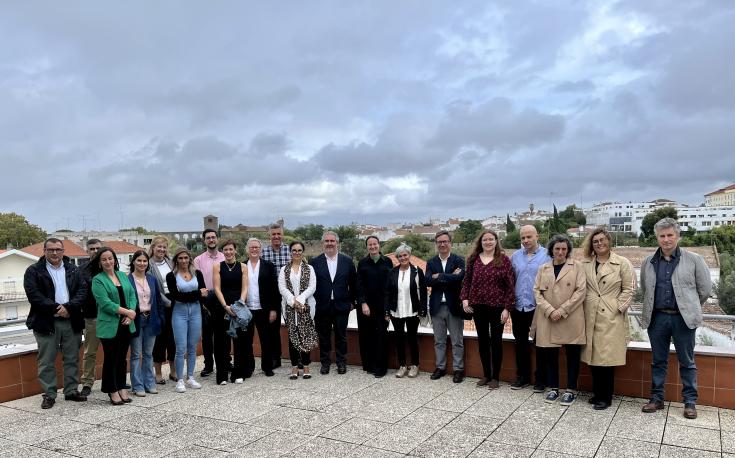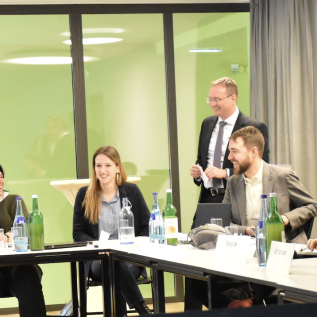Mobility as a service for low-density areas: key learnings

On 17-18 October 2023, the Policy Learning Platform held an onsite peer review in Portugal for the Commission for Coordination and Development of the Alentejo Region (CCDRA), which requested advice regarding their policy challenge on Mobility as a Service (MaaS) for very low-density areas.
The CCDRA sought to address the policy challenges of providing better mobility services for its citizens, specifically in the low-density areas of the region, and was interested in examining the following questions:
Peers from across Europe
Alongside Katharina Krell and Astrid Severin, our Thematic Experts on ‘Greener Europe’, six excellent peers participated in the peer review:
- María López Gálvez, Regional Government of Extremadura, Department of mobility, transport and housing, ES
- Rachel Tully, AGENEX, ES
- Irene Nicotra, Livorno Province, Tuscany Region, IT
- Massimiliano Petri, Livorno Province, Tuscany Region, IT
- Jenni Eckhardt, VTT Technical Research Centre of Finland, FI
- Jorge Bandeira, University of Aveiro, PT
Recommendations
Today, Alentejo Region is already running a pilot with demand-responsive transport (DRT) involving 8 municipalities and aspires to expand the service to all municipalities of Alentejo. To this end, a public intermunicipal call centre has been implemented and services all pilot areas.
Currently, taxis are used for DRT services which must be booked one day in advance. A GIS system determines the best route (shortest) depending on the demanded stops. The following recommendations of the peer review should help to improve.
The expert peers suggested to build a holistic regional strategy including a roadmap and projects that link mobility, energy and tourism. The region could reinforce its efforts in supporting and financing networks, branding, training, co-creation with citizens and stakeholders as well as building infrastructure and projects.
Another important role for the region would be to communicate the reasoning behind the strategy whilst keeping the momentum of the European Capital of Culture process and of the tangible messages already created.
The peers underlined that the availability and assessment of mobility data is key for the development of functional MaaS solutions. The experts suggested to develop an inventory of all existing mobility offers and assets (public transport, taxis, statutory transport, private bus operators, minibuses, tourism buses, …) as well as an inventory of all professional drivers and potential voluntary drivers.
Moreover, the experts proposed to revisit the current public transport map to gain greater insight into current mobility patterns and to re-design the regional mobility plan. In addition, it is crucial to establish the mobility demand in the low-density areas so that the DRT service map can complement and extend the formal public transport lines.
The peers underlined the importance of linking mobility policy with tourism and energy policies. Mobility and connectivity are quality of life factors which also encompass inclusion and accessibility. Mobility is a two-way road that serves not only to bring people from the low-density areas to the bigger cities and hospitals but also to move visitors, businesses and tourism to the hinterland.
Linking the tourism strategy with mobility will be very helpful in this regard, and the region could consider identifying points of interest in the different municipalities and villages and supporting the creation of itineraries. Moreover, the peers suggested to link renewable energy production with e-mobility solutions and to finance renewable energy and e-charging infrastructure.
A digital integrated info-mobility system could be developed, joining the different operators in one system and integrating traditional public transport offers with new DRT schemes. The system should allow to communicate local public transport service scheduling from transport manager to public administration and to communicate timetable and routes to citizens.
The booking platform should be designed according to citizen preferences. One integrated booking platform could allow to book and pay for a trip with several modes of transport. Same-day booking by phone and app should be possible.
The recommendations of the peer review will be reflected in the implementation of the mobility strategy of the Alentejo Region.
The host’s policy challenges, and the detailed peer suggestions can be found in the follow-up report.
Pleased with the outcome of two full days of intense discussions moderated by the Policy Learning Platform, the hosts shared the following:
We are so thankful for this work together during the two days of the peer review and the excellent presentations and cooperation offers from the peers. We see the need to have better data and test new solutions as fast as possible. We will definitely arrange a follow-up such as a visit to the tourism entity in Italy.
A big thank you to all. The recommendations have been really important. They bring us support, collaboration and confidence for the future of our mobility system. I am particularly happy that reduction of traffic and access to people were mentioned, and that the importance of data to facilitate decision-making was underlined. We will definitely also take a look at the circulation of public vehicles (municipal, parishes, fire department…) and see how we can integrate them.

Peer review publication
Find more information on the methodology and experiences of previous beneficiaries in our publication.

Apply for a peer review
Start your peer review application process today and find solutions to your policy challenge with our expert and peers!

